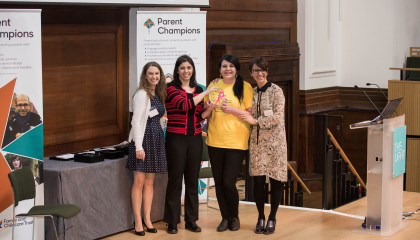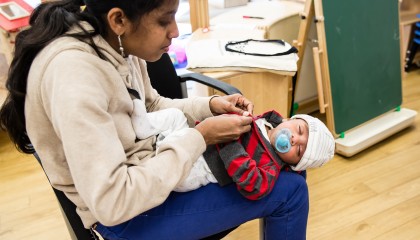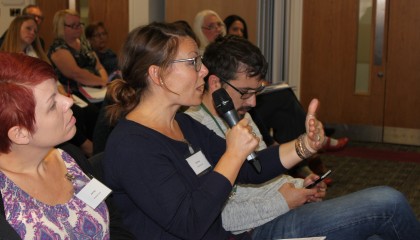You are here: The Spring Budget: reasons for celebration and caution
breadcrumb navigation:
- Home /
- The Spring Budget: reasons for celebration and caution

The Spring Budget: reasons for celebration and caution
What a huge week for childcare. The £4bn investment in the childcare and early education system is welcomed by parents crippled by the current huge costs of childcare - over £14,000 per year for a full time place on average. It means that by 2025 parents will be able to access substantial support from the end of maternity or parental leave rather than managing eye watering costs until their child is entitled to 30 hours at age 3 as is currently the system. It goes a long way to solve the affordability problem in the childcare system.
While this investment is hugely welcome and exciting, it does not solve every problem in the sector and, most importantly, it does not yet grasp the full potential childcare policy has to change lives.
Let’s look at the good news first. The changes to Universal Credit mean that low and middle income families will be able to get support for their childcare costs upfront and that support will cover more expensive childcare than is currently the case. While we would still like to see the support available through Universal Credit raised even further in order to support the cost of full time care right across the country (the maximum amounts are still below the average cost of full time care in 62% of local authorities), these changes will really help families to move into and stay in work.
The real game changer for families though is the expansion of 30 hours of childcare for under 3s. We know that the key pinch point for families has been when children are young and costs are high, with little support available - this support is targeted directly at that period.
The key challenge now is making sure that this offer lives up to parents’ expectations - and that means enough places available right across the country. Our Childcare Survey 2023 found large and growing childcare shortages - less than half of local areas have enough childcare for parents working full time and this is down 11 percentage points in just a year. Two drivers of these shortages is underfunding of the current free hours offer and recruitment and retention pressures on the sector. Getting the funding right for this expansion is key - but the Women’s Budget Group have found that there is likely to be a £5.2bn shortfall by 2025/26. The expansion of free hours will mean that the Government will be the biggest buyer of childcare in England, and childcare providers will have limited opportunity to make up any shortfall from parents’ fees. It is essential that the Government gets the funding rate right so that childcare providers are actually able to offer these places.
In addition, there needs to be an effective workforce strategy to attract workers to join this hugely rewarding sector. This strategy needs to fully understand the factors that are making recruitment and retention so difficult - pay is high among these factors, but also recognising the invaluable work they do caring for and supporting the development of children during their crucial early years. The incentives announced for new childminders will feel like a nice bonus for those who receive it, but does not seem like enough to address the steady decline we have seen in childminder numbers over many years. It also does nothing to help retain the experienced and skilled childminders who may consider leaving the sector.
The decision to increase adult to child ratios for two year olds from four children per adult to five makes recruitment and retention even more challenging. It is a move in the wrong direction. It does not prioritise the quality of early education and childcare and instead has the potential to exacerbate the workforce challenges.
I get really excited about childcare when we think of the double potential it holds - it not only enables parents, and mothers in particular, to work in the way that they want to work, but it also boosts the life chances of young children, with the biggest benefits for the most disadvantaged. This budget made great strides in enabling parents to work, but it did not grasp the opportunity to change young lives. All the new funding is directed towards working, and therefore better off, families. There was nothing for those facing disadvantage. It will make it easier for parents to move into work and raise their family income, but the child whose parents do not or cannot work will start school having been entitled to just a third of the early education and childcare that their peers with working parents will have been entitled to. There is strong evidence of the benefits that high quality early education makes for young children’s outcomes, which is why this inequality in access feels so unfair.
Currently disabled children are the most likely to miss out - our research found that just 18% of local areas have enough childcare for disabled children. This expansion provides a huge opportunity to rethink how childcare is delivered and fix the problems that have frozen disabled children out to date. The Government will now hold more control on pushing up the quality and accessibility of childcare and we look forward to working with the Government to make sure that every child is able to access high quality early education and childcare.
So it’s time to put down the glass of champagne, roll up our sleeves, and get to work on making sure this announcement lives up to its potential.

More from our blog
Parent Champions Conference and Awards 2025
What a fantastic two days at the Parent Champions Conference and Awards 2025!
The Exciting Story Of The First Year Of Books Together
The Exciting Story of Books Together
The NAFIS Conference and Awards 2024
Read about the NAFIS Conference and Awards 2024
Welcoming the new NAFIS chairs
Coram Family and Childcare is delighted to announce the appointment of Maryam Makki
Understanding the take-up of early education entitlements
Why do some children miss out on early education, and what can be done to help?
Parent Champions Awards 2024
We were excited to celebrate the valuable contributions of Parent Champions schemes across the UK
Tacking barriers to access in early education
Why do some children miss out on their free place, and what can be done to increase take-up?
Spotlighting the role of Family Information Services at the NAFIS conference
Family Information Services play a vital role their local communities.
Celebrating collaboration and innovation at the NAFIS Awards 2023
One of the most memorable part of the conference is the opportunity to celebrate our amazing local authority members at the NAFIS awards.
Making a difference: from volunteering to employment
Emma and Bonnie share their journeys from Parent Champions to Universal Services Practitioners.
The power of parent voice and experience
Connecting with families in a meaningful way, the value of parent voice and coproduction.
Understanding the take-up of early education entitlements
Why do some children miss out on early education, and what can be done to help?
Parent Champions Awards 2023
We were blown away by the quality of the nominations we received and the impact that Parent Champions are having in their community.
Parent Champions Conference 2023
After another busy year for our Parent Champions network, we came together to reflect, connect and look ahead to the future.
On the Outside: Enabling parents from migrant backgrounds to access childcare provisions could help address existing inequalities
Government needs to make sure that all working families can access much needed childcare support.
Meeting the childcare needs of children with SEND
Katie Ghose (KIDS) and Catherine McLeod (Dingley's Promise) speak about the lack of childcare for children with SEND, what's causing it, and how to fix it.

Childcare Survey 2023: why it shows system reform is needed
Our new blog explores how evidence from the Childcare Survey 2023 can inform real change to the current system.
Childcare and the budget: what should we hope for
On Saturday, the front page of The Guardian read Tories plot childcare giveaway in budget
Understanding the take-up of early education entitlements
Why do some children miss out on early education, and what can be done to help?
Recognising the achievements of Family Information Services
Last week, we hosted the annual NAFIS Conference, and we closed the conference with the NAFIS Awards
Welcoming the new NAFIS chairs
Coram Family and Childcare is delighted to announce the appointment of Paul Herbert and Anna Ellis

The impact of COVID on early childhood education and care and opportunities to strengthen the system
Our new blog explores how evidence from the Childcare Survey 2022 can inform real change to the current system.

Looking back at 21 Years of The Childcare Survey
James Hempsalls OBE reflect on 21 years in the early years sector.

The current childcare system is flawed but the solutions are out there
Our new blog explores how evidence from the Childcare Survey 2022 can inform real change to the current system.
Another year older, another year wiser...21 things we've learnt about childcare
In this new blog, we look back at 21 lessons we have learnt since the publication of our first ever report
Celebrating International Women's Day 2022: The history of childcare and gender equality
International Women’s Day presents a vital opportunity every year to call for action in the global fight for women’s rights.
The NAFIS Awards 2021
Read about the NAFIS Conference and Awards 2021.
The Spending Review is an opportunity to tackle urgent issues in the early education and childcare sector
In this blog, Megan Jarvie sets out three urgent issues that the Spending Review needs to address in light of the impact of COVID-19 on early childhood education and care.
Welcoming the new NAFIS chair
Coram Family and Childcare is delighted to announce the appointment of Alex Brace as the next chair.
Holiday childcare must be at the top of the agenda
Our new report calls on Govt to prioritise childcare in pandemic recovery planning to give both children and parents the support they need now.

Old challenges, new concerns: how Covid-19 has magnified inequalities in the childcare system
A consultation with 20 stakeholders representing children and families points to the emergence of ‘winners’ and ‘losers’ from the pandemic, largely reflecting pre-Covid-19 inequalities.
Coram Life Education EYFS Training
Coram Life Education have launched new training workshops to support Early Years Foundation Stage (EYFS) practitioners in understanding and implementing the new EYFS framework and Development Matters.

Childcare and Covid Research Webinar
This webinar will present the findings from interviews with 122 Local Authority Early Years Leads in spring this year
Parent Champions Awards 2021
The eagerly awaited awards ceremony celebrated the inspiring achievements of our volunteers
Parent Champions Conference 2021
After a challenging year, this was a fantastic opportunity to share experiences and celebrate achievements
Putting wellbeing and mental health at the heart of our work
As we mark Mental Health Awareness Week 2021, we reflect on how Coram Family and Childcare has put mental wellbeing at the heart of our programmes over the last year.
The early years must be at the heart of pandemic recovery
Our annual report into the cost of childcare produces a worrying picture of the sector, which shows that pre-existing issues in the system have been exacerbated by the impact of the pandemic.
Parent Champions Brent for Resilient Families
Coram Family and Childcare are excited to be working with London Borough of Brent on Parent Champions for Resilient Families.

Covid and Childcare research webinar
We are organising a webinar to introduce the Covid and Childcare study to local authorities.
Parent Champions Christmas Heroes
Coram Family and Childcare want to say a massive thank you to all of our Parent Champion volunteers

Potential childcare shortages should cause concern for all
Our research has found that the end of Covid funding could lead to childcare providers closing in over half of local areas.
The NAFIS Awards 2020
We hosted the first ever NAFIS Awards ceremony at the conference on Monday 16 November
NAFIS Conference 2020
NAFIS hosted the first ever virtual conference on Monday 16 November

The Impact of COVID-19: Learning From Our Parent Champions
Over the last few weeks we have been talking to our Parent Champions about the impact COVID-19 is having in local communities
Parent Champions Conference 2020
We were delighted to welcome our wonderful parent volunteers to this year's conference, held in the QEII Centre at Coram Campus

A complex system of childcare support causes too many families to miss out
The Childcare Survey 2020 finds that prices have increased and there are still shortages in sufficency.

Loneliness among parents common but the solutions are out there
Our new project, supported by the National Lottery Community fund, will support eight groups of local parents to to combat loneliness while their children are young.

Supporting new mothers to work is key to the future of gender equality
We looked at women in the UK from the year before they had a baby to up to three years afterwards to investigate what could be influencing their choices about paid work.

Here comes the sun: a lack of holiday childcare can dash hopes of relaxation for parents this summer
Only a third of areas in England have enough holiday childcare for working families, and high prices mean many families struggle to afford it.

Limited opportunities – families in London lack access to school age childcare
Many families in London will struggle to find or afford a childcare place for their school age children, limiting the opportunities of both parents and children.

Families risk being left behind by rising childcare costs
Finding affordable childcare remains an uphill struggle. The Childcare Survey 2019 finds that the price of childcare has increased, and that there are significant shortages.

Celebrating Parent Champions volunteers
We were proud to celebrate Parent Champions volunteers for their hard work and dedication at the Redbridge Children's Centres Awards 2018.
Older people and their families will struggle to find suitable care in later life
The third instalment of the annual Older People's Care Survey reveals that four in five older people in the UK are at risk of a struggle to find social care.

Department for Education visits Parent Champions East Sussex
Last month, we visited Parent Champions East Sussex at Crowborough Children’s Centre with the Department for Education, to learn about the good work they are doing in the community.

New research shows that childcare works – but information matters
Childcare entitlements for 2 and 3-4 year olds are providing benefits for parents and children, but families are missing out because of a lack of information.

Parents and carers face barriers to staying in work, but there are workable solutions
One in every three workers in England looks after a child or an adult. Their caring and working responsibilities often putting competing demands on their time.
Why is early years provision so different in Sweden and the UK?
Between 1996 and 1998, England, Scotland and Sweden moved responsibility for all early childhood education and care and school-age childcare services from welfare into education.

The benefits of volunteering as a Parent Champion
Parent Champions are part of a community of parent volunteers gaining valuable experience while helping local families.
Improving information on childcare for children with SEND
Providing clear, easy to access information about free entitlements is vital to helping parents of children with SEND know about and take up this offer.

Public attitudes about working parents are shifting
The majority of the British public support the government and employers topping up the wages of low income families, and more are in favour of mothers returning to work than ever before

One week since becoming Coram Family and Childcare
One week since joining the Coram group of charities to become Coram Family and Childcare, we are already seeing the positive impact on our work.
Introducing Coram Family and Childcare
Our Chief Executive, Ellen Broomé, introduces Coram Family and Childcare
Update from NAFIS Chair
Our NAFIS Chair, Philip Ryan from London Borough of Hillingdon, gives an update of NAFIS' recent work and plans for the next few months.

Parents feel the heat as holiday childcare prices rise at well above the rate of inflation
Our Holiday Childcare 2018 finds rising childcare prices and a lack of availability, leaving some parents struggling to make work pay this summer.
What is the Matthew Effect and what does it mean for childcare?
How do you stop the poor getting poorer while the rich get richer? That was the focus of a study published earlier this year by Dr Wim Van Lancker..

New research highlights the impact of part time work on the gender pay gap
IFS estimate that if female employees worked as much in full time roles as their male counterparts, the gender pay gap would reduce by a third.

Making sure that childcare investment reaches the children that need it most
New research from the London School of Economics shows that poorer children are more likely to miss out on early education.
Parent Champion Caerphilly becomes the first Welsh scheme to join the Parent Champions National Network
Welcoming our first Parent Champions scheme in Wales to join the National Network.

Early education: big gains but missed opportunities
A new study from Germany provides further evidence on what many working in early years have known for some time: that universal early education can give a big boost to outcomes for the most disadvantaged children

Making sure there is enough childcare and early years services in a rapidly growing and diverse inner London borough
Gareth Platt from London Borough of Tower Hamlets, on ensuring enough childcare and early years services in a rapidly growing and diverse inner London borough
'Since becoming a Parent Champion, I have not been happier'
Parent Champion of the Year 2017, Jade Taylor, shares her inspirational story of how becoming a Parent Champion has transformed her life
An afternoon at the Palace
Every year, the Queen opens her garden at Buckingham Palace to over 30,000 members of the public who have made a positive impact on society.
Next steps for NAFIS
Recently I was appointed as Chair of NAFIS and I wanted to write to you to introduce myself.
How much is holiday childcare going to cost parents this summer?
For the past 16 years, the Family and Childcare Trust have been gathering information about the cost and availability of holiday childcare.
Parent Champions Croydon are helping mothers seeking asylum overcome isolation
Parent Champions Croydon are addressing community need through peer to peer support.
Childcare costs rise, but funding rates stay steady
If funding rates do not match delivery costs, childcare providers will struggle to keep their doors open and to provide high quality childcare.
Who benefits? Discussing new childcare policies in Parliament
The All Party Parliamentary Group will be discussing Tax Free Childcare and 30 hours.
How much would it cost to extend 30 hours to parents in training?
We want the Government to extend the 30 hours of free childcare for three and four year olds to parents in training in England.
Getting ahead: parents in training need childcare too
Qualifications have a significant impact on employability: having no qualifications more than doubles the likelihood of unemployment for both men and women.
Upfront childcare fees can nip parents’ job prospects in the bud
With wages and benefits normally being paid in arrears, upfront childcare deposits can make it impossible for parents to get into work.
It is vital to support local authorities to assess childcare sufficiency
While English local authorities are legally required to report annually on local childcare availability, there is no simple, uniform method for doing this.
Cookie-cutter funding is no recipe for a healthy childcare system
We asked a range of childcare providers what impact they expected the 30 hour free childcare offer for working parents to have on their setting.
Why the number of childminders in London is dropping
There has been a steady twenty-year decline of registered childminders in Britain, and in London numbers are falling faster.
Mayor of London is raising the childcare bar to reduce inequality in London
The Family and Childcare Trust has supported the Mayor and Greater London Authority to develop their early years strategy.
Childcare system is unfair and must be changed, Treasury probe confirms
The Treasury Select Committee has published its report on Tax Free Childcare and the 30 hour extended entitlement.

Fathers remain locked out of family life
A new report recommends policy changes to support fathers to balance parental responsibilities with work.
Why Parent Champions coordinators from Hillingdon are excited for the Parent Champions conference and awards 2018
When working on the day to day aspects of our Parent Champions scheme, it is easy to forget that we are part of a nationwide network.
Vote for us in the 'My Favourite Voucher Codes' charity poll
Each month, My Favourite Voucher Codes gift 20 per cent of their profits to a charity.
Why did childcare prices rise, and what does it mean for families?
The last year has seen some of the most significant changes to childcare funding in years.
Sharing notes with early years practitioners at the Childcare Expo
The Family and Childcare Trust is participating in the expo to raise awareness of our work and engage with professionals from the sector.
11 ways NAFIS supported a FIS newcomer
How the NAFIS membership has helped a FIS newcomer
How Parent Champions Camden are supporting their local children’s centres
Parent volunteers are helping children to get the best start in life.
Treasury inquiry is a defining moment for future childcare policy
It's time to make childcare fit for families in the 21st century.
Open letter to Santa Claus
Dear Santa, we've been good this year.
The cost of childcare is not just about price: an international perspective
New OECD research shows that second earners gaining work doesn't always translate to financial gains for families.
Social Mobility Commission recognises impact of Parent Champions bridging the gap
Parent Champions have been recognised by the Social Mobility Commission as an effective way to increase uptake of early years services.
Persistent care shortages leave older people with few choices
The second installment of the annual Older People's Care Survey reveals that 4.2 million older people in the UK live in areas that do not have enough care.
Parent researchers share findings at APPG for Families in Early Years
Early years services can be a lifeline for parents and children, providing a positive space and helping families avoid poverty in the long run.
Parent researchers highlight parents’ need for early years services
Early years services can be a lifeline for parents and children, providing a positive space and helping families avoid poverty in the long run.
Tackling language difficulties early on is a low-cost high-impact solution
Three new reports highlight the importance of language to children's development and the most effective approaches to tackling language difficulties.
Parent Champions Wolverhampton boost take up of free childcare by 20 per cent
Improving outcomes for children is at the heart of the work carried out by Parent Champions in Wolverhampton.
FIS staff share their thoughts on NAFIS Conference 2017
This week the annual National Association of Family Information Services (NAFIS) Conference took place in London, bringing together Family Information Services (FIS) from all over the country.
Social mobility in the early years: a missed opportunity?
A new report suggests that recent progress in improving life chances for more deprived children in the early years are in danger of stalling.
When Parent Champion Mihriban met the Director of Early Years & Childcare
Michelle Dyson visited to see how Parent Champions are helping increase take up of free childcare and narrow the attainment gap in their borough.
Will Government’s changes to how we assess children’s development measure up?
As of 2020, a new baseline assessment will be introduced for children at the start of reception and SATs will be non compulsory for seven years olds as of 2023.
We must back childcare professionals supporting children at risk of abuse
Teachers are trained to identify children at risk of domestic harm, but the few years before school can be a long time to wait for a child.
Five reasons to attend NAFIS Conference 2017
NAFIS Conference is a brilliant opportunity to engage with government departments and hear from speakers who lead in policy for early years.
How our newest parent-led programme supports migrant and refugee parents
All of the work we do at the Family and Childcare Trust focuses on making sure parents have the support they need to make genuine choices about their lives.
Improving education for children with SEND includes improving childcare
We urge the London Assembly Education Panel to consider the challenges of early education and childcare in their review of SEND provision.
Getting it right for the next generation starts with the right early years policies
A new report from Lucy Powell MP and the Social Market Foundation shows just how important the early years can be in supporting social mobility.
How can we help dads parent from the very beginning?
As part of the fight for gender equality, the role of paternity leave is a crucial one.
How volunteering helped a new mum find her strength and start a charity
"Volunteering pushed me outside my comfort zones and added value to my life."
How to make government policy on school age childcare achieve its promise
We asked local authorities about the impact of the 'right to request' policy on whether there was enough childcare in their local area.
Gender and pay: why having kids shouldn't mean a pay cut
A new report by the Equality and Human Rights Commission today shows that the UK's gender pay gap is stubborn and persistent
Three in five of us will have to care for a loved one at some point in our lives
We can all be doing more to raise awareness about the needs of families with disabled children.
Thousands of families are playing outside today to mark Play Day
Providing a rich home learning environment for children can be a challenge. Play can be an effective (and fun) solution.
Evaluation of 30 hours pilots highlights need for annual funding review
A much awaited evaluation of 30 hours pilot schemes has been published amid speculation about the impact of the roll out on families and childcare providers.
Long term study following 4500 children links childcare to better outcomes
New evidence shows use of childcare provides benefits for child development at age three regardless of a family’s disadvantage level.
Parents are dealt a double blow by holiday childcare this summer
New research reveals a price hike coupled with a drop in holiday childcare availability.
Quality in early years in academies on par with maintained schools
Almost a quarter of primary schools in England are now academies, meaning thousands of children are getting childcare in an academy.
Parent-led childcare: will it work in the UK?
We are getting ready to launch pilot childcare sites run by parents, for parents.
How we provide care can cement inequalities within generations
When thinking about how we reduce inequality, it is key to consider how unpaid care can either help or make things worse.
Tea with the Queen and other things that make volunteering worth it
So what is the Queen’s garden party and how did our volunteers get invited?
Our new Parent Champions share their reasons and expectations for volunteering
With Volunteers Week just around the corner, we spoke with some of our new Parent Champions about their experiences.
General Election 2017: What are the parties going to do for families?
After a week of manifesto launches, we now know what the nationwide parties are pledging to do for families in the UK.
It's time to put early education on equal footing with school education
We want to see childcare places made a legal entitlement and childcare funding matched with schools.
To make childcare work, we must champion childcare professionals
Childcare professionals are helping the next generation to learn vital life skills while being underpaid and undervalued.
The business case for making childcare work for families
The costs of under-utilising women’s skills is estimated to be between £15 billion and £23 billion every year.
Ground-breaking kinship carers project has supported over 500 families
Kinship care can be a key opportunity to give children the support they need to thrive, but it's not easy.

Childcare can help stop broken social mobility from rewarding wealth over talent
Children with low cognitive ability but wealthier backgrounds are more likely to become high earners than their brighter peers.
What we can learn from innovation in childcare from across the world
From intergenerational care in Japan to subsidised nanny services in Australia, here's how we can move childcare in the UK forward.
Childcare’s dirty secret: 20,000 nursery staff paid below minimum wage
New data reveals that one in ten nursery workers is being paid illegally low wages.
The numbers behind the Parent Champions programme
Having childcare places available is not enough if parents don't know about it. That's where Parent Champions come in.
Parent Champions have a vital role to play in a changing childcare system
Since 2007, Parent Champions have been filling information gaps between parents and the support services available to them.
The price and value of early education: as much learning for half the money
Small increases in childcare investment will be spread thin across increases in hours.
Parents shut out of work by high childcare costs
When up to 45 per cent of your income can go on childcare, it simply does not pay to work.
For many, full time work is not enough to provide children with basics
Households with children are much more likely than other households to not have enough money for a decent standard of living.
The invisible factors that go into quality childcare
There is much debate about how to improve quality in childcare settings. New research raises questions about the impact of graduate-led childcare.
Quality shortcuts don't lead to a working childcare system
New research reveals significant concerns about how the upcoming extension to free childcare could impact on the provision of quality early education.
Challenging perceptions of working women through photography
A ground-breaking photographic project that celebrates and shines a light on the diversity of women in the workplace.
Early education for looked after children has been a policy blind spot for too long
Only 18 per cent of looked after children in England get 5 GCSEs at grade C or above, compared to 64 per cent of their peers.
Spotlight on a Parent Champion from Wolverhampton
How a pregnant mother went from volunteering to landing a paid job.
Is London’s diversity reflected in childcare settings?
London is a hugely diverse city. People come to live here from almost every country in the world.
How we can raise quality in the early years
The Family and Childcare Trust paper, published today, is the third in a series of three papers looking at quality in the early years.
How England’s nursery lottery is failing too many children
Today’s new report from Save the Children highlights an acute shortage in the early years workforce.
CBI agree that investment in childcare makes economic sense
It’s fantastic to see the CBI also flying the flag for increased childcare investment for the good of the nation.
NAFIS Conference 2016 zeroes in on innovation and the future
I found this year’s NAFIS Conference in London to be a very useful and informative event.
Should we take a page from these footballers' playbook on housing?
Last week saw a surprising and welcome intervention from three former footballers who plan to build a £400m housing scheme for rent and purchase at a mix of affordable and market prices.
This year's 2016 NAFIS Conference is ready to kick off
Tickets have sold out to the largest annual gathering of Family Information Service professionals from across the country.
Little Village's new headquarters opens its doors to an ambitious future
Little Village, a parent-led scheme that collects good-quality children’s clothes and equipment, donated by local families
If we want proper care for the elderly, we must treat care workers properly
Seventeen care workers in Haringey are taking their employer and the local council to an employment tribunal for allegedly failing to pay the minimum wage.
Our analysis and response to the DfE’s early years funding consultation
We looked at how funding will change for local authorities and providers after the transitional period to understand the long term impact of the proposals.
What is the role of childcare in solving poverty in the UK?
The Joseph Rowntree Foundation recently published an ambitious long-term strategy to solve poverty in the UK.
How the gender pay gap widens when you have children
This week’s briefing from the IFS on the gender pay gap was illuminating on the role that becoming a parent has on pay inequalities:
7 things to know about the consultation on early years funding
The Department for Education recently published the long-awaited consultation on the future funding of free early education and childcare for three and four year olds.
Celebrating our 10th year of Parent Champions this Volunteers Week
Parent Champions volunteer for a few hours a week, talking with local parents about childcare and other family services.
Unlocking 1 million jobs to flexibility: it’s time
Hire Me My Way is a new campaign designed to transform the job market for people who need flexible or part time work.
Childcare - a crucial issue in May's elections
On 5 May, adults in most parts of the UK will have the chance to vote in elections for the Scottish Parliament, the Welsh and Northern Ireland Assemblies, the Greater London Authority (Mayor and Assembly) and for council seats in many local authorities in England. There is a lot at stake, as the results will have an impact all over the UK.
Celebrating Parent Champions
In a city or town near you there are Parent Champions, parent volunteers who give up a few hours of their time every week to chat to other parents about childcare and local services.
Celebrating the work of Parent Champions
For vulnerable families, access to information, advice and support can make the difference between flourishing or falling through the net.
Talking to your MP | Young Dads Collective
It can be difficult for fathers to balance job centre appointments and childcare.
Family unity crucial to all who are legally settled in the UK
There are a small number of families in the UK who won’t be spending time together. While their relationships are genuine, arbitrary Immigration Rules have driven them apart. Christmas is a bitter time for such families.
Women are getting sick of pregnancy discrimination
As a charity providing advice and information to pregnant women and new mothers at work, Maternity Action hears some terrible stories.
What I learned at the NAFIS conference 2015
This year I was lucky enough to go to another highly rewarding NAFIS (National Association of Family Information Services) Conference.
Family Friendly Week - Get Creative Competition
The aim of Family Friendly Week is to increase recognition of the issues faced by families up and down the country.
Spotlight on Parent Champions Tower Hamlets
Parent Champions Tower Hamlets are diversifying how they use the Parent Champions model to reach more parents.
Get Creative Family Arts Festival is Launched
The Family Arts Campaign is proud to support the Family and Childcare Trust’s Family Friendly Week.
Legal advice and a campaign to help end childcare inequality for disabled children
Leveling the Playing Field is a new campaign which aims to tackle the inequality faced by parents of disabled children struggling to access childcare.

New report highlights the importance of Family Information Services in Wales
For parents and children to benefit from the range of services available locally, they need to know what is on offer.
The importance of breakfast for children's learning
Thirty years ago I was a newly-qualified teacher at a school in Essex.
Childcare support gap
Our country does not have a unified system of financial support for childcare.
Celebrating the end of a good year for flexible working
At Family and Childcare Trust we take work-life balance seriously.
Shared Parental Leave will help build a family friendly workplace
Shared Parental Leave will make the UK workplace a more family-friendly environment.
Parliamentarians support Family Friendly Week
We are delighted that lots of parliamentarians are supporting family friendly week this year!
What does family-friendly Britain look like?
The Family and Childcare Trust was happy to hear David Cameron pledge that all new policy be subject to a family friendly test.
Inspections alone will not ensure high quality early education
A new survey reported on concerns about Ofsted inspection of nurseries, having found that 19,000 out of 77,000 nurseries had not been inspected.
Small actions, big difference - reflecting on the impact of volunteering for children and families
Two pieces of research have got me thinking about the impact of volunteering.
Another week, another high profile story for early education and childcare
Last week Ofsted published its first Early Years report, with Sir Michael Wilshaw’s speech receiving wall to wall media coverage.
No Shortage of Words on Tax-Free Childcare - But What's Happened to the Mission to Explain?
Family and Childcare Trust Chief Executive Anand Shukla has blogged for the Huffington Post on the new tax-free childcare scheme.
Childcare prices rise faster than the Government help for parents
Childcare is a key part of a modern state’s infrastructure. Without affordable childcare provision, the skills of working parents are lost.
Current childcare system is not working and must change
Our annual Family and Childcare Trust childcare costs report shows the current childcare system is not working and must change.
Sign up to our newsletter
Get the latest news, research and resources from Coram Family and Childcare





































































































































































